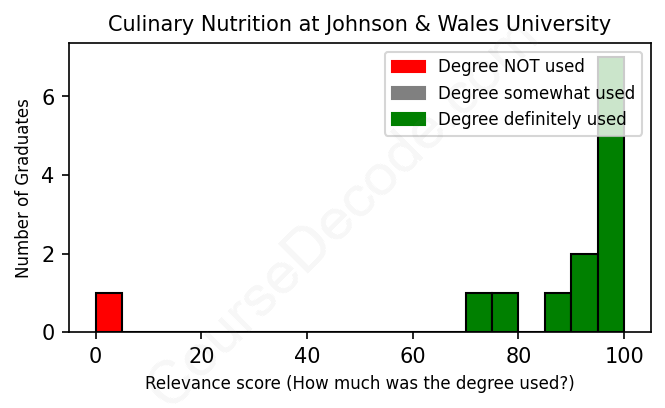
First, some facts. Of the Culinary Nutrition graduates from Johnson & Wales University we've analyzed , here's how many have used (or NOT used) their degree in their career:

These are estimates based on AI analysis of 13 LinkedIn profiles (see below).
The verdict? Significantly above average. Overall, with an average relevance score of 86%, Culinary Nutrition graduates from Johnson & Wales University have a much higher likelihood (+19%) of finding work in this field compared to the average graduate across all fields:
And for comparison, here's the chart for all profiles we've looked at across all degrees.
Also, after graduating, 46% of these graduates have pursued further education other than another Bachelor's degree (such as a Masters degree or other), compared to the average across all profiles of 35%. This suggests you may need more than just a Bachelors degree to be competitive as a Culinary Nutrition graduate.
See the details:
|
Relevance score: 79% We think this person has gone into a career highly relevant to their degree. We think this person has gone into a career highly relevant to their degree.
DEGREE INFOGraduated in 2019 from Johnson & Wales University with a Bachelor of Science (B.S.) in Culinary Nutrition. Also pursued further education since (see below). JOB HISTORY SINCE GRADUATIONDietetic Intern Wellness Workdays Aug 2019 - Jun 2020 Licensed Chiropractic Assistant  Princeton Brain & Spine Sep 2019 - Nov 2020 Registered Dietitian  Eating Matters Nov 2020 - Present FURTHER DEGREES DONE SINCE GRADUATINGMaster of Science - MSSimmons University 2019 - 2021 ABOUTRegistered Dietitian Nutritionist, Chef, and Licensed Chiropractic Assistant; equipped with the knowledge and skills to educate individuals on the fundamentals of food. Skilled in clinical nutrition, menu planning, diet analysis, whole food supplementation, data entry, culinary arts, rehabilitative & therapeutic exercises, and application of physio therapies. Johnson & Wales University Alumni with a Associate of Science (A.S.) in Culinary Arts & a Bachelor of Science (B.S.) in Culinary Nutrition and Clinical Dietetics. Simmons University Alumni with a Master of Science (M.S.) in Nutrition and Health Promotion. |
The top 10 most common jobs done by the graduates we've analyzed (ranked most common to least) are:
Here is a visual representation of the most common words in job titles for Culinary Nutrition graduates (this is across all Culinary Nutrition graduates we've analyzed, not just those who went to Johnson & Wales University):

Looking at the career trajectories of Johnson & Wales University graduates in Culinary Nutrition, it's clear that many of them start their journeys in related fields right after graduation. Early roles often include positions like dietetic interns, nutritional specialists, and various chef positions in healthcare or educational settings. These jobs typically focus on promoting healthy eating and food preparation that aligns with nutritional guidelines. Over the first few years after graduation, many seem to progress quickly into more advanced positions. For instance, some move from being interns or entry-level chefs to roles such as registered dietitian or executive chef, showing a solid redirection towards careers directly related to culinary nutrition.
Five to ten years later, the pattern continues with a noticeable trend toward higher-level management roles within the food service or nutritional sectors. Graduates often find themselves in positions like district chefs, wellness managers, or dietetic supervisors, indicating that they are leveraging their education effectively and pursuing fulfilling careers in nutrition-focused industries. That said, there are also some graduates who venture into unrelated fields, but those seem to be the exception rather than the rule. Overall, it appears that most of these graduates are finding solid career paths that align well with their Culinary Nutrition degrees, establishing themselves in both culinary roles and nutritional health sectors.
Honestly, a Bachelor’s degree in Culinary Nutrition can be a mixed bag in terms of difficulty. It’s definitely not a walk in the park, as you’ll be juggling both culinary skills and nutritional science, which can get pretty technical. You’ll have to be ready to put in some serious kitchen time, learn a lot about food chemistry, food safety, and nutrition theories, and keep up with assignments that might include recipe development or meal planning. It’s more challenging than a typical liberal arts degree but can be super rewarding if you genuinely love cooking and healthy eating. So, if you've got passion and dedication, it can be a fun and engaging journey!
Most commonly, in the LinkedIn profiles we've looked at, it takes people 3 years to finish a Bachelor degree in Culinary Nutrition.
Alright, so looking at these graduates from Johnson & Wales University, it seems like most of them have landed pretty decent jobs in the culinary and nutrition fields, especially as they gained experience. The ones who graduated earlier seem to have climbed the ladder into executive positions or strategic roles, which usually pay well—like the Executive Chef at Sodexo or the Senior Manager Strategic Sourcing at CBRE. Others, like the Registered Dietitian or Special Education Teachers, might not be as high-paying initially, but these roles typically have good earning potential and stability over time. The more recent grads are still in the early stages of their careers, with internships and entry-level positions, so they might not be raking in the big bucks just yet. Overall, it looks like there’s a good chance of making decent money with experience and the right opportunities in this field.
Here is a visual representation of the most common words seen in the "about" section of LinkedIn profiles who have a Bachelor degree in Culinary Nutrition (this is across all Culinary Nutrition graduates we've analyzed, not just those who went to Johnson & Wales University). This may or may not be useful:

Here are all colleges offering a Bachelor degree in Culinary Nutrition (ordered by the average relevance score of their Culinary Nutrition graduates, best to worst) where we have analyzed at least 10 of their graduates:
| College | Score | Count |
|---|---|---|
 Johnson & Wales University Johnson & Wales University
|
86 | 13 |